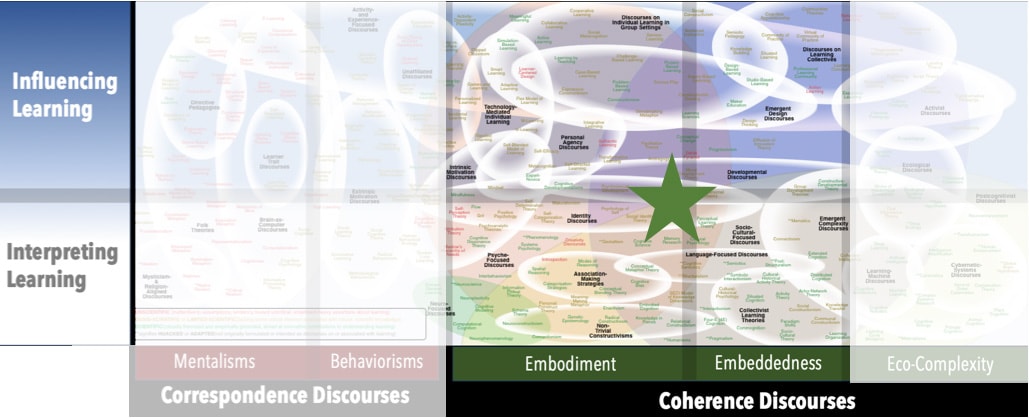AKA
Progressive Education
Progressive-Democratic Theory
Focus
Defining a counterpoint to the ideology and practices that define traditional educationPrincipal Metaphors
- Knowledge is … evolving scope of possibility
- Knowing is … informed participation in democracy
- Learner is … a social agent
- Learning is … engaging
- Teaching is … facilitating
Originated
late-1800sSynopsis
Progressivism arose as a counterpoint to emphases and structures of 19th-century public schooling. Reframing schooling as a participation in life rather than preparation for life, Progressivism was oriented and informed by Pragmatism. However, it is most often characterized in terms of such defining practices as personalized, lifelong, and experience-based learning; problem-solving and real-world contexts for learning; social and collaborative engagements during learning; and responsible and informed democratic citizens as a main goal of learning. Associated discourses include:- Connected Learning (Mimi Ito, 2010s) – an educational attitude that emphasizes learning as a socially connected, interest-driven, and academically oriented process. Founded on the principle that learning is most effective when it connects personal passions and interests with educational goals and career aspirations within a supportive community or network, Connected Learning aims to combine the learner’s personal interests, supportive relationships, and meaningful real-world opportunities.
- Techno-Progressivism (Tech-Progressivism) (various, 1990s) – a type of Progressivism in which technological developments are foregrounded as tools of emancipation, empowerment, and democratization, provided they are monitored and held accountable
Commentary
Most often, Progressivism is defined against a more traditional educational emphasis, such as:- Educational Essentialism (Back-to-Basics) (Michael John Demiashkevich, 1930s) – a conservative, society-focused, and teacher-centered educational philosophy that is exemplified in back-to-basics curriculum content and expository teaching approaches. That is, adherents of Educational Essentialism assert that formal education should focus on core knowledge – that is, “essentials” that are drawn from the accumulated knowledge of western civilization, that enable the development of sound character, and that are vocationally oriented.
- Perennialism (Educational Perennialism; Universal Curriculum) (Allan Bloom, 1970s) – a liberal, humanity-focused, and teacher-centered educational philosophy that is conceived in terms of universal human relevance – that is, around principles that matter to all people, everywhere. Advocates of Perennialism typically emphasize great works, as opposed to core knowledge. Compared to Educational Essentialism, curricula associated with Perennialism tend to be more principle-based than fact-based and its associated pedagogies tend to involve more critical engagement and less exposition.
- Whole Child (Whole Child Approach) – a teaching attitude that aims to be attuned to matters of learner well-being, social-emotional competence, and development levels
- Narcissistic Learning (Self-Centered Learning) – a consequence of modes of schooling that cater to individuals’ self-interests (including values, preferences, and whims) to the detriment of social development, community standards, collective process, and academic rigor
Authors and/or Prominent Influences
Jean-Jacques Rousseau; Johann Heinrich Pestalozzi; Friedrich Fröbel; John Dewey; Rudolf Steiner; Maria Montessori; Robert Baden-PowellStatus as a Theory of Learning
Progressivism is not a theory of learning, but original articulations of the perspective were explicit about theoretical commitments around learning.Status as a Theory of Teaching
As noted above, Progressivism is characterized in two broad ways, one as a philosophy of education, and the other as a collection of schooling practices and emphases. On the latter count, it can be properly characterized as a theory of teaching.Status as a Scientific Theory
It would be a stretch to describe Progressivism as scientific, especially given the range of interpretations and practices that have come to be associated with it. However, it does satisfy some of our key criteria for a scientifically informed theory, including being critically attentive to assumptions of learning and being associated with a substantial body of empirical evidence.Subdiscourses:
- Connected Learning
- Educational Essentialism (Back-to-Basics)
- Narcissistic Learning (Self-Centered Learning)
- Perennialism (Educational Perennialism; Universal Curriculum)
- Techno-Progressivism (Tech-Progressivism)
- Whole Child (Whole Child Approach)
Map Location

Please cite this article as:
Davis, B., & Francis, K. (2025). “Progressivism” in Discourses on Learning in Education. https://learningdiscourses.com.
⇦ Back to Map
⇦ Back to List
